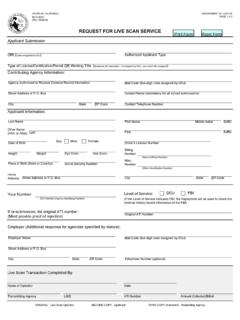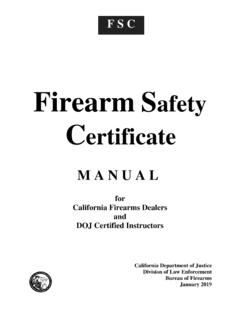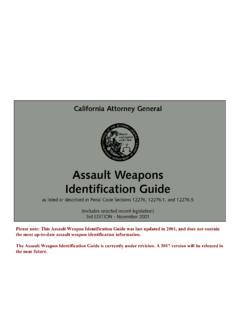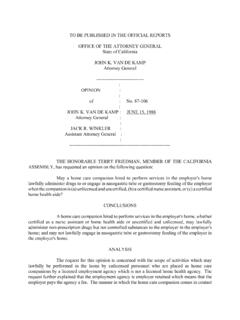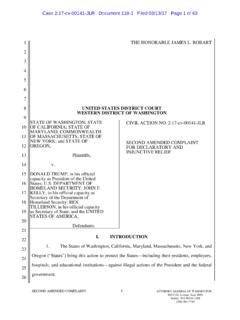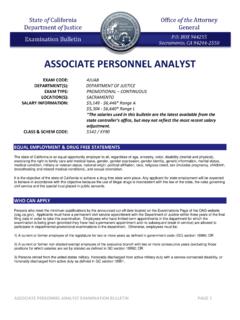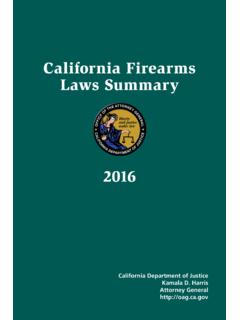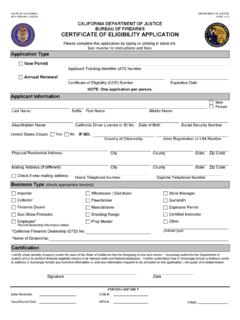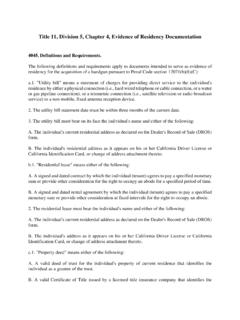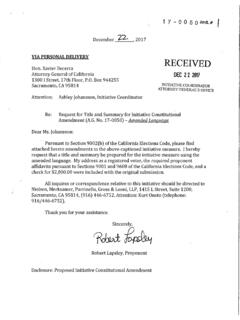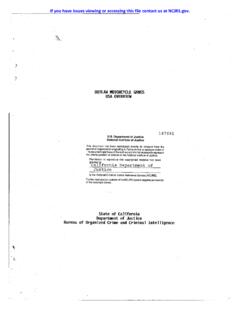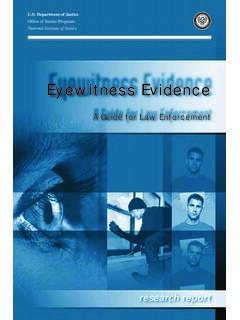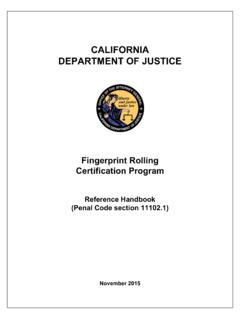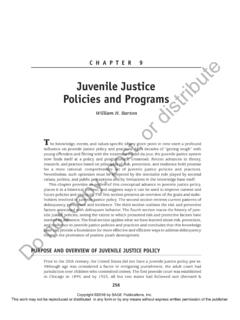Transcription of 18-10-CJIS: California Values Act's Database Guidance
1 Xavier Becerra, Attorney General California Department of justice California justice INFORMATION SERVICES DIVISION Joe Dominic, Chief No. 18-10-CJISC ontact for information: CLETS Administration 1 Date: 10-01-2018 Subject: California Values Act 's Database Guidance TO: ALL CHIEFS OF POLICE, SHERIFFS, and EXECUTIVES OF California LAW ENFORCEMENT AGENCIES Database Guidance -Senate Bill 54 This Information Bulletin (18) provides Guidance to state and local law enforcement agencies (LEAs) on best practices regarding the governance of databases regarding Senate Bill (SB) No. 54 (De Leon; 2017-2018 Regular Sessions) ("the Values Act ") to ensure information is limited for immigration enforcement purposes to the fullest extent practicable and consistent with federal and state law.
2 The Values Act mandates that the Attorney General , by October 1, 2018 , publish " Guidance , audit criteria , and training recommendations aimed at ensuring that" databases operated by state and local law enforcement agencies "are governed in a manner that limits the availability of information therein to the fullest extent practicable and consistent with federal and state law, to anyone or any entity for the purpose of immigration enforcement. " LEAs are strongly encouraged to review and update their existing Database governance policies consistent with this Guidance . This 18is not intended to displace any current policies that are aligned with or provide greater protections than those included herein.
3 Nor does the lack of a particular recommendation necessarily indicate disapproval of any policy . Rather , this 18 provides some foundational recommendations and should serve as a resource to enhance current policies with respect to the Values Act's goal of ensuring that databases are governed in a manner that limits the availability of information to the fullest extent practicable and consistent with federal and state law for the purpose of immigration enforcement. GUIDING PRINCIPLES In enacting the Values Act , the Legislature determined that "a relationship of trust between California 's immigrant community and state and local agencies is central to the public safety of the people of California .
4 " (Gov. Code, ) The Values Act's core purpose is to ensure effective policing and to protect the safety, well-being , and constitutional rights of all the people of California , regardless of immigration status. The Values Act set the parameters under which LEAs may engage in "immigration enforcement. " "Immigration enforcement ," as defined by the Values Act , includes any efforts to investigate , enforce , or assist in the investigation or enforcement of any federal civil immigration law , and also includes any efforts to investigate, enforce , or assist in the investigation or enforcement of any federal criminal immigration law that penalizes a person's presence in, entry, reentry to, or employment in, the United States.
5 The Values Act generally prohibits LEAs from using agency or department moneys or personnel to investigate , interrogate , detain , detect , or arrest persons for immigration enforcement purposes , including providing personal information for that purpose. (Gov. Code, , subd. (a)(1 )(D).) The Values Act, however, Information Bulletin California Values Act's Database Guidance Page 2 permits LEAs to participate in law enforcement task forces, including sharing confidential information pursuant to these task forces, where the primary purpose of the task force is not immigration enforcement.
6 (Gov. Code , 7284 .6, subd . (b)(3).) And , the Values Act permits LEAs to provide immigration authorities with information about a person 's criminal history accessible through the California Law Enforcement Telecommunications System (CLETS). (Gov. Code, , subd. (b)(2).) The specific requirements for LEAs under the Values Act are set forth more fully in IB 2018-DLE-01 , and specific data reporting requirements can be referenced in IB 18-02- cjis . Additional principles of state and federal law should also be used to guide LEAs in developing Database governance policies that limit the availability of information for purposes of immigration enforcement.
7 Under California law, LEAs are generally prohibited from asking a person about his or her immigration status . (Gov. Code, , subd. (a)(1 )(A).) Also, LEAs are restricted from sharing personal information about a person that is not available to the public, and that is not attached to a person's criminal history. (Gov. Code, , subd. (a)(1 )(D), (b)(2).) Notwithstanding that prohibition, consistent with federal law, 8 1373, nothing in this IB prohibits or restricts LEAs from sending or receiving information regarding a person 's immigration status or citizenship status to or from federal immigration enforcement authorities , or prohibits or restricts LEAs from maintaining information regarding a person's immigration status.
8 1 Federal courts have found that Section 1373 only prohibits restrictions on the sharing of immigration or citizenship status information, and not restrictions on the sharing of home and work addresses , and release dates. 2 Courts have also found 8 1373 to be unconstitutional under the Tenth Amendment of the Constitution, so LEAs should ask their counsel to monitor developments in the Consistent with federal and state law, this IB offers Guidance on steps LEAs can take to govern the use of criminal justice information (CJI) that is non-criminal history information . Non-criminal history information contained within databases accessed through CLETS , other DOJ criminal justice information systems , as well as LEAs' individual databases should not be used for the purpose of immigration enforcement.
9 And, any implementation of the policy recommendations in this IB should be applied to all law enforcement agencies equally , regardless of whether they are federal , state , or local law enforcement. Federal immigration authorities should not be denied access to law enforcement databases solely based on their status as a federal immigration authority, so long as they comply with the policies governing use of the databases. Guidance SURROUNDING USE OF NON-CRIMINAL HISTORY INFORMATION All users should agree that they will not use any information for purposes of immigration enforcement, as defined in California Government Code section , subdivision (f), with respect to an individual who does not possess a criminal history.
10 Individuals who have a criminal history include those with a prior criminal arrest or conviction . This restriction does not impact persons with criminal records within CJI systems. Users are also not prohibited or restricted from sending to, or receiving from , federal immigration authorities , information regarding the citizenship or immigration status , lawful or unlawful , of an individual , or from requesting from federal immigration authorities information regarding a person 's immigration status , maintaining such information , or exchanging such information with any other federal, state , or local government entity , pursuant to 8 1373 and 1644.
